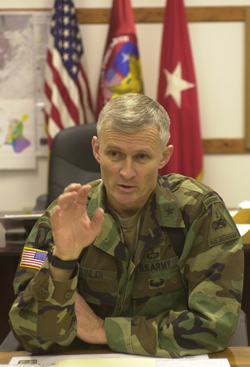|
General
Sees Gains
Photos
by Keith Nordstrom
OPERATION KOSOVO
BY CRAIG BORGES / SUN CHRONICLE STAFF
CAMP BONDSTEEL, Kosovo --
Success here is measured not in days or weeks, but in blocks
of
months, years and maybe even decades.
Peace and freedom -- the
kind people in the United States, Canada and Western Europe
enjoy -- may be
the goal of NATO peacekeepers here in the war-ravaged Yugoslav
province, but it's not something they
expect any time soon.
The goals of the United
States and the many other nations making up the Kosovo Protection
Force are
much simpler and tend to focus on the basics -- reduce the
number of ethnic killings, bombings and
intimidation, and prevent such ethnic violence from spreading
to places such as Macedonia or the
dominate Yugoslav province of Serbia.
 For
the past several months that responsibility in the U.S.-patrolled
sector of Kosovo has fallen on the shoulders of U.S. Army
Brig. Gen. Kenneth Quinlan, a native of Warwick, R.I. For
the past several months that responsibility in the U.S.-patrolled
sector of Kosovo has fallen on the shoulders of U.S. Army
Brig. Gen. Kenneth Quinlan, a native of Warwick, R.I.
In an two-hour-long interview
in his Camp Bondsteel office last week, Quinlan, who leaves
his post as commander of Task Force Falcon and operations
in the sector known as the Multi-National Brigade
East later this month, reflected
on the role of the United States in the Balkans, its successes
and its challenges.
"I'm proud that we're
leaving Kosovo in better shape than we found it," he
said. "We'll leave here knowing that we've put Kosovo
further along the road to peace, away from violence."
Quinlan, a former Rhode
Island Army National Guardsman who graduated from Warwick's
Vets Memorial High School and the University of Rhode Island,
said the violence level experienced today in Kosovo -- occasional
bombings, shootings and riots, is relatively low considering
less than two years have passed since the province was embroiled
in a full-scale war.
"We've been able to
keep the violence outside of Kosovo for the most part,''
he said. "There are no military solutions here in Kosovo."
He said the military's role
is to provide a safe and secure environment for Kosovars
to work out their problems through political means.
"The problems here
are political, and we can't impose a military solution on
it," he said. "We can provide opportunity for
Kosovars and Serbs, but if they can't take this opportunity
to make the most of it, that's not our concern. It won't
take months but years, possibly generations."
Quinlan used the stock market
to illustrate the day-to-day situation in Kosovo.
"The trend on our stock
right now is up,'' he said. "It's showing a capital
gain. From that
perspective, it's positive."
But, like the stock market,
things change daily.
Life changes daily
Violence at Kosovo's border
involving ethnic-Albanian rebel groups from Kosovo, threaten
the
province's fragile peace daily.
This morning, for example,
the Macedonian army exchanged heavy fire with ethnic Albanian
rebels
holed up near a northern village, shattering a lull in fighting
meant to give politicians a chance to resolve
the crisis, the Associated Press reported.
Mortar, machine-gun, rocket
and tank fire rocked the village of Vaksince close to the
Kosovo border a
day after the country's leaders agreed on creating a new
coalition government in a bid to keep the
country stable.
The fighting, which more
than likely involved rebel ethnic Albanian forces from Kosovo,
could further
escalate tensions and complicate attempts to reach political
solution to the violence.
And on Thursday, NATO peacekeepers
seized dozens of weapons intended for ethnic Albanian rebels
in southern Serbia. Among the items seized were 52 rocket
launchers, a couple of dozen anti-tank
weapons, five S The weapons were intended for ethnic Albanian
rebels fighting in southern Serbia in
an area known as the Ground Safety Zone. The three-mile
wide area was created by NATO after NATO
forces drove Serb soldiers from the province in 1999.
The zone follows a mountain
range that separates Kosovo from Macedonia as well as Serbia
and was
designed to keep the Serb soldiers and NATO apart. But ethnic-Albanian
rebel fighters from Kosovo
quickly moved into the zone, using it as a home base to
conduct quick raids into both Serbia and
Macedonia.
Most of the Ground Safety
Zone has been relaxed but the most volatile section of the
zone, that area that
runs along the Serbian border, is expected to be relaxed
within a few weeks allowing Serb soldiers to
move in and flush Kosovo-based rebels out.
Quinlan, though admitting
violence may be sparked by the relaxation of the Ground
Safety Zone, said
the move was a necessary hurdle to overcome on the road
to a more stable region.
`` If you measure where
we are today to two years ago, it's incredible progress,''
he said. `` It's really
a good-news story.''
He had nothing but praise
for the many soldiers -- U.S. and otherwise -- who have
made such a peace
possible.
`` Every day the American
soldier is covering us in glory,'' he said. `` We really
are training the next
generation of Kosovars. Those kids are watching you, how
you conduct your business as a
professional. The fact that the U.S. army is multi-ethnic,
that sends an impression.''
He said the tours of duty
for the U.S. soldiers, which usually last six months to
a year, have an
incredible impact on them.
`` They take the story back
to hometown America,'' he said. `` The soldiers leave knowing
that by
accident of birth, they enjoy the freedom that they do.''
CRAIG BORGES, The Sun
Chronicle's assignment editor, was in Kosovo with Photo
Editor Keith
Nordstrom, to cover local troops serving as NATO peacekeepers
in the Yugoslav province.
|